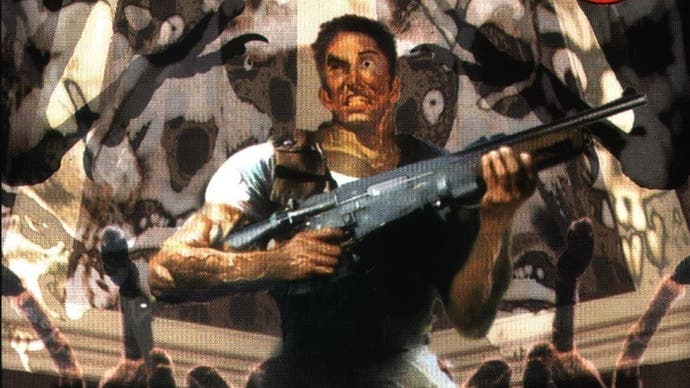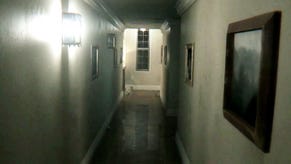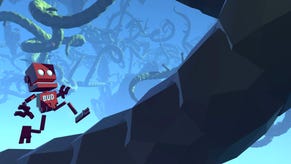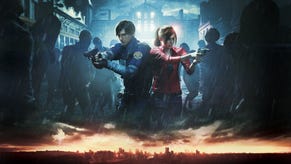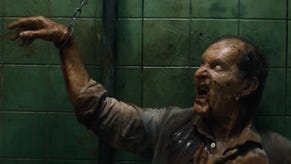As Resident Evil turns 25, its loremaster digs into the first game's many secrets
Master, unlock.
Resident Evil is celebrating its 25th birthday. The first game in the Capcom's zombie horror series launched in Japan on the PlayStation on 22nd March, 1996. It is a well-documented work, a game analysed to within an inch of its life over the years in articles and videos and interviews. So, to mark the occasion, we thought we'd do something a bit different: speak to Resident Evil's loremaster to get fresh insight into the Resident Evil that started it all.
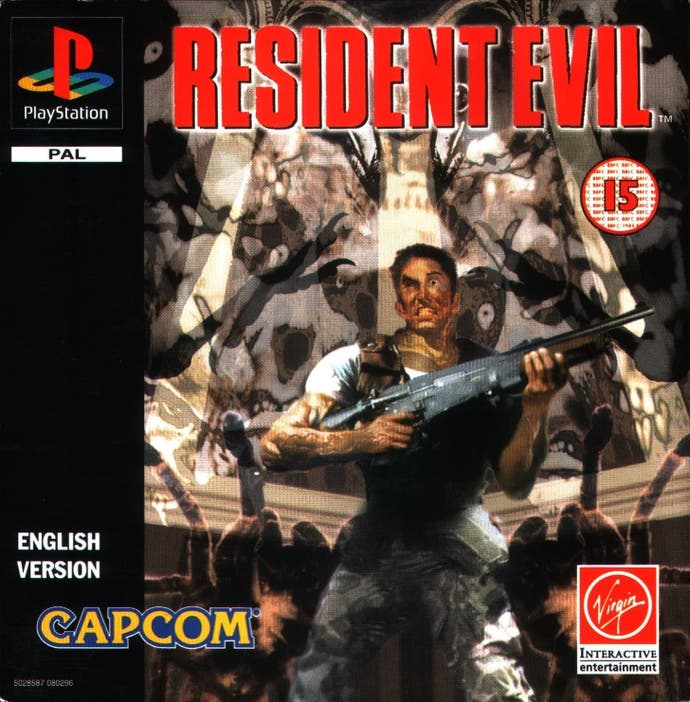
"TheBatMan" is perhaps the biggest Resident Evil fan in the world, and we've reported on his work before: a 2700-page long document, a decade in the making, that details the entire mythology of the Resident Evil series.
As I said at the time, it is comprehensive. Totally, utterly comprehensive. It starts millions of years ago, with the genesis of the Plagas from Resident Evil 4, then moves all the way up to the events of Resident Evil 7. This is a canonical summary - as canonical as an unauthorised timeline can be, anyway - of the entire video game series.
Now, on Resident Evil's 25th birthday, it's worth digging a little deeper into the first game of the series. What are the standout story moments that impacted the series for years to come? Are there any inconsistencies? Any ongoing mysteries? And what about that GameCube remake?
Over to TheBatMan. He should know, of course...
First off, what was your first experience of playing Resident Evil?
TheBatMan: My first exposure to the game was watching it at a friend's house and it was unlike anything I'd seen before. Up till that point, my somewhat limited video game experiences comprised largely of platform games, side-scrolling beat-em-ups, and primitive first-person shooters. This was something completely unique. The fixed camera angles and third-person perspective brought a really rich depth of immersion to the game, allowing for detailed graphics and making the whole experience feel like an interactive movie. From that moment I knew I had to have it.
My first time playing involved staying up practically all night one weekend. I did not have a memory card for my PlayStation either so that only added to the stress of the experience! But I was instantly taken with the characters and the setting, the mansion back then was so foreboding, and the puzzle-solving elements were really satisfying. The characters were well-fleshed out and even each individual creature you encountered was given a background. It really was the perfect horror package in video game form.
What did you think of it at the time, and now, 25 years later, what's your view of it?
TheBatMan: Soon after completing the campaign with each character, it quickly became my favourite game of all time. I thought it was utterly compelling and shelling out full-price to buy the Director's Cut not too long afterwards was a no-brainer. The game has had a massive impact on my life and the reason I am so looking forward to Resident Evil Village like a big kid is because of this timeless original.
But to my great shame, since the GameCube remake came out in 2002, I have rarely re-visited the original. I have attempted several times and always gotten distracted by one thing or another. But as we approach the release of Village, I decided to revisit it from start to finish and I played standard mode as Jill and Director's Cut as Chris. And I have to say it was one of my best Resident Evil experiences... Being so used to the remake, there were so many little details I'd forgotten, and it took me back to my childhood trying to remember what was where, and I was so low on ammo and herbs, I had to plot a safe route round the mansion like I used to in the very early days. I'd also forgotten just how absolutely lethal the Hunters are in the original. They are terrifying!
The Director's Cut was also a nice accompaniment, changing item and enemy placements, and showcasing new camera angles and environmental changes. There are also some elements I wish had been carried over into the remake, such as the choices you have to make when Barry drops the rope after fighting the Yawn, or choosing to go with him or not in the tunnels when his behaviour is starting to get a little suspicious. Needless to say I came away with a newfound fondness for the original and I won't wait as long next time to play it again.
What are the standout story moments from Resident Evil (1996) that have had a significant impact on the series' lore in the years since it came out?
TheBatMan: The twist of Albert Wesker turning traitor from trusted S.T.A.R.S. leader to an Umbrella researcher obviously carried major repercussions for the series storyline right up until the climax of Resident Evil 5. I remember playing the game as Jill for the first time and the storyline tried to shape Barry Burton as the possible traitor, then being totally mind blown when you view the slides in the lab and see Wesker alongside his fellow researchers. These days that twist is almost comically obvious, but back then, playing it for the first time when I was just a kid, it was a bombshell moment.
The aftermath of the mansion incident also directly led to the events of Raccoon City. Fallout from the mansion biohazard led to people in Raccoon becoming infected long before Hunk's botched operation to seize the G-Virus in Resident Evil 2. Thanks to what happened in the first game, Raccoon City was always doomed. The t-Virus being spread by rats in the aftermath of G-Birkin's massacre of Hunk's team only speeded up the process. RE1 also name-dropped Ada Wong, a character who to this day remains a central puzzle piece to many unresolved and long-standing plot lines.
Then there is Umbrella itself. Despite the old Umbrella Corporation being long gone in the canon, it is still a major draw for fans of the series, and one of the intriguing images we have seen from Resident Evil Village is the familiar umbrella symbol which seems to tie into the four House families of the game. Some fans have noticed the colours of the umbrella are inverted too, which match the Blue Umbrella PMC resurrected for Resident Evil 7, rather than the original company. But my personal theory is that Village will explain the origin of this original symbol Oswell Spencer later took for his own company. Either way, it seems certain that Village will still have some ties to the events of the very first game, not already counting the involvement of Chris Redfield of course.
Has Capcom managed to avoid retconning any of the events of the first Resident Evil over the years as the overarching storyline has become larger and more complex?
TheBatMan: Overall, they have done a surprisingly good job, but a couple of things do come to mind. Obviously, the resurrection of Albert Wesker in Code Veronica was a major plot bombshell at the time and seemingly retconned his death at the hands of the Tyrant in the first game. Although having said that, one of the main writers, Kenichi Iwao, has given several interviews over the years hinting that there was always something in place to bring Wesker back so maybe that was always part of the plan.
Resident Evil Zero also retconned the initial t-Virus leak in the Arklay Lab, changing it from a simple accident at the hands of careless researchers, to a deliberate leak by the Queen Leech in its guise as James Marcus, a former founding member of Umbrella who was murdered and had all his research stolen by Spencer. He burned for revenge and wanted Umbrella destroyed, so the circumstances around the initial biohazard at the mansion were changed to accommodate this plan. The initial dispatch of STARS Bravo Team was also changed to occurring 24 hours earlier in the canon to allow for the events of Resident Evil Zero to take place.
Are there any inconsistencies, mysteries or unanswered questions relating to the first Resident Evil game that remain?
TheBatMan: Something that I have always pondered is that there is no obvious place where the Hunters were kept. Obviously, players will recall that they are seemingly released by Wesker at the mid-point of the game when he instructs the player to head back to the mansion, resulting in some memorable and terrifying experiences. But when you reach the labs at the end of the game, there is nowhere obvious we explore where they could have been stored. There is an urban myth they were housed in the tanks in the Tyrant's room, but I do not think that has ever been confirmed.
In terms of inconsistencies, I suppose RE Zero adds some minor discrepancies, with Rebecca's character in the first game suddenly being nonsensically clueless about what is going on. Chris Redfield not having a clue what Umbrella is, despite the corporation having such a large presence in Raccoon City and actually part-funding the S.T.A.R.S. unit, is also a little odd. But these are minor, minor nit-picks.
How does the 2002 GameCube remake factor into the lore? What are the significant changes you need to consider for your timeline?
TheBatMan: In terms of lore, the remake is the definitive version of the game for me. It reinserted the lost Trevor's Letters which were removed from the original at a late stage and introduced Lisa Trevor as a minor stalker enemy. It also retained pretty much all the plot points introduced in the original. For my project I had to factor in many small changes such as the revised deployment date of Bravo Team, shifting the fate of pilot Edward Dewey because of the role he now played in RE Zero, and adding all the mansion backstory thanks to the addition of previously cut material.
In addition to in-game elements, Capcom also released 'Wesker's Report II', a supplemental background file which delves deep into the backstory of the game. It detailed not only Albert Wesker's history with Umbrella, but the entire t-Virus project, how the G-Virus was discovered, the origins of Nemesis, as well as references to the Ashford family and t-Veronica. It really was a treasure trove of material for the lore fan. Even if you are someone who only likes to stick to the in-game content, I'd thoroughly recommend you read this if nothing else. It is widely available online and is a deep dive into the storylines of several titles. This one document alone really fleshed out the timeline, filling in many major gaps and answering numerous unanswered questions.
Do you consider the revised script, new story details and new subplot that was cut from the original as canon, or do you defer to the original? Can both games be considered canon?
TheBatMan: In my opinion both games can be considered canon. Unlike the re-imaginings of 2 and 3, the original remake was largely a faithful reconstruction of the original with added elements bolted on. Around 98 per cent of the original game's content was preserved. The restored Trevor's Letters and Lisa Trevor sub-plot introduced for the remake is interesting and takes us to some dark and tragic places, but it is not essential to the overall story of the series. So while the remake contains more lore, purists who prefer the original game are not really missing out on anything I would call vital. But if I could change one minor element of the remake, it would have been to keep the Scrapbook file, which was strangely omitted. In the original this consisted of newspaper clippings about all the monster sightings and murders in the Arklay Mountains leading up to the events of the game.
Is there anything else of note you wish to mention about the original Resident Evil? Any cool tidbits fans would love to hear about?
TheBatMan: There are many legends about the first game, such as the original enemies all being ghosts. Extraterrestrial enemies were also considered at one point before they eventually settled on zombies. The game was also going to first-person and after rethinking the gameplay system, Capcom briefly conceived a two-player experience where both characters would roam the mansion together.
An interesting point for me is that the game's director, Shinji Mikami, was so intent on crafting the perfect haunted house experience, that he did not believe the game needed a scenario and it was only through pressure from his bosses that the likes of the aforementioned Mr Iwao was brought in, which led to the final scenario and the creation of important elements such as Wesker and Umbrella. I am forever grateful for that. Mikami also wanted to call the game 'Psycho' but the background staff came up with a name that matched the story, and that resulted in 'Biohazard'. As for Resident Evil, well the game takes great influence from Japanese horror movie 'Sweet Home' and its accompanying RPG game. One note in that game reads 'The house of residing evil', so read into that what you will!
